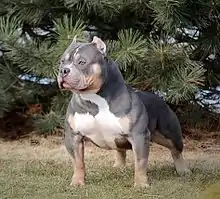American Bully
The American Bully is a recently formed companion dog breed, originally recognized in 2004 by the American Bully Kennel Club (ABKC) and followed by the European Bully Kennel Club (EBKC)in 2008. It has been recognized by the United Kennel Club (UKC) since July 15, 2013.[1] The breed has not been recognized by the American Kennel Club (AKC). The American Bully is a small to large breed, which has been divided into four categories by some registering organizations, including Pocket, Standard, Classic, and XL. Other organizations, including the UKC, have one consistent size standard.
| American Bully | |||||||||||||||||||||||||||||
|---|---|---|---|---|---|---|---|---|---|---|---|---|---|---|---|---|---|---|---|---|---|---|---|---|---|---|---|---|---|
.jpg.webp) American Bully | |||||||||||||||||||||||||||||
| Common nicknames | Am. Bully Bully | ||||||||||||||||||||||||||||
| Origin | United States | ||||||||||||||||||||||||||||
| |||||||||||||||||||||||||||||
| |||||||||||||||||||||||||||||
| Dog (domestic dog) | |||||||||||||||||||||||||||||
History
The American Bully, as it is now known, began development in the 1980s with the majority of the final behavioral and aesthetic product being completed in the 1990’s. There is consensus that at least five other breeds were used to attain the more "bully" physical traits desired as well as the more diminutive size of some lines.[2] The American Pit Bull Terrier (APBT) was the foundation (parent breed) used to create the American Bully.[1] The APBT has maintained a characteristic appearance and temperament for over a century.[1] Within that span of time different strains of APBT emerged within the breed, each with respective physical attributes.[1] One particular APBT strain developed a specific, stockier, physique that warranted recognition as a different breed altogether.[1] The bloodline of this APBT strain was then influenced with the introduction of American Bulldog, English Bulldog, and Olde English Bulldogg in order to fine-tune desired physical characteristics and personality traits.[1]
The breed was first recognized by its breed club, the American Bully Kennel Club (ABKC), in 2004.[3] This registry first acted as a means to document pedigrees and show the breed against its written standard. According to the ABKC the initial desire for this breed was to produce a dog with a lower prey drive and more of the "bully" traits and characteristics than the American Staffordshire Terrier. Mass and heavy bone was prioritized to ensure such a look, and due to this many of the dogs shown today display the wide front for which they were originally bred.[3]
The breeds development and popularity are commonly tied to the growth of the hip hop movement. The American Bully as described in this article should not be confused with the several other bulldog-type breeds, American Staffordshire Terrier[1][3] or other "Pitties" (as they are known) that rose in popularity and were utilized in cruel Blood Sports during this same timeframe such as the infamous Michael Vick case.[4]
Varieties
Within the ABKC, the four varieties are separated by height without specification of weight. All these varieties are expected to follow the same standard with minor alterations.[3]
All dogs are classified and shown as Standard until they reach a year of age, at which point they are separated into the varieties and shown against their own type.
Standard

The standard American Bully type is a medium-sized dog with a compact bulky muscular body, heavy bone structure and blocky head. Male dogs must be 17 to 20 in (43 to 51 cm), while females must be 16 to 19 in (41 to 48 cm).
Pocket

The "pocket" type is a smaller variant, with full-grown males under 17 inches (43 cm), but no less than 14 inches (36 cm), at the withers and females under 16 inches (40 cm), but no less than 13 inches (33 cm), at the withers.
XL
An XL type is determined by its adult height, with males between 21 inches (51 cm) and 23 inches (57 cm) at the withers and females between 19 inches (48 cm) and 22 inches (54 cm) at the withers.
Classic
The classic is a lighter-framed dog than the standard, but falls within the same height range. These dogs do not display the exaggerated features often found in the other varieties, and arguably display clearer American Pit Bull Terrier/American Staffordshire Terrier lineage.[5]
Unofficial types
Outside of the breed standard, dogs shorter or taller than the named variations have been bred. Smaller dogs are sometimes called "Micro", and larger ones are called "XXL", but neither are recognized by the kennel clubs as legitimate varieties.
Temperament
The American Bully is a highly adaptable and trainable breed, often acting as a loving companion.[6] Many dogs, despite acting as lapdogs in the home, do well in sports such as weight pull and flirt pole. Dog and human aggression is bred out of the American Bully and is discouraged in breed standards.[1]
Health
Health problems vary within the breed and span the entire spectrum; with some varieties being plagued by problems, and others being well documented for health and quality.[7] Testing is not as commonplace in the breed as in older breeds; though hip and elbow scoring are the most frequently conducted. Cherry eye, ectropion, and entropion are often seen affecting the eyes; while Brachycephalic Respiratory Syndrome can be seen in the shorter muzzled dogs.
External links
| Wikimedia Commons has media related to American Bully. |
References
- "United Kennel Club: American Bully" (PDF). Official UKC Breed Standard. July 2013.
- "Breed Standards : American Bully - United Kennel Club (UKC)". www.ukcdogs.com. Retrieved September 27, 2018.
- "The American Bully Registry". theabkcdogs.org. Retrieved November 28, 2017.
- "PIT BULLS AND THE HIP-HOP CULTURE". www.madison.com. Retrieved December 14, 2020.
- Magazine, BULLY KING (March 3, 2017). "Everything You Need To Know About The Fastest Growing Dog Breed: The American Bully". Medium. Retrieved September 27, 2018.
- "American bully dogs bred as lovers, not fighters". San Francisco Gate. August 24, 2010. Retrieved September 27, 2018.
- "The New Breed: Is there trouble with designer dog breeding?". Sinclair Broadcast Group. Retrieved September 27, 2018.
